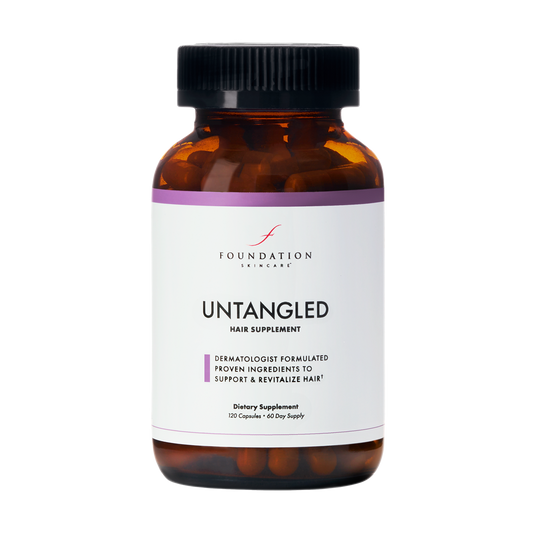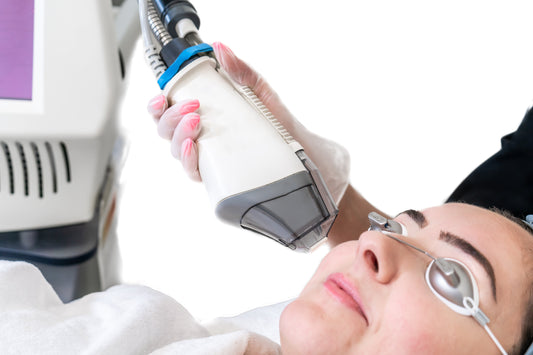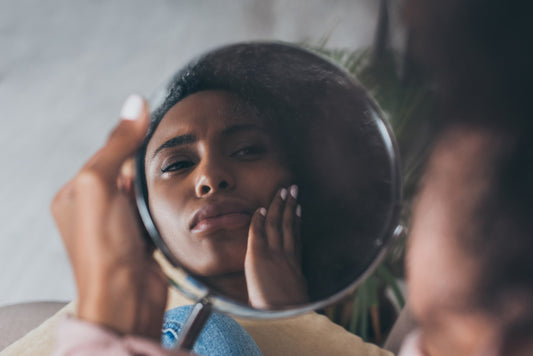There are many myths out there about how to speed up hair growth, from brushing 100 times a day to getting frequent trims. But what about hair oiling? Does the practice of pouring oil on your hair actually increase growth, luster, and shine?
Read on to find out what experts have to say about the reputed benefits of oiling hair overnight, how often you should oil your hair, and what oils are recommended if you’re ready to give it a try.
What Is Hair Oiling?
With roots in Ayurvedic medicine, hair oiling is the practice of spreading or massaging natural oils into the scalp to promote hair growth, increase volume and shine, and even prevent gray hair. Different oils have been shown to have different effects1, with coconut oil providing moisture, sesame oil reducing gray hair, castor oil promoting growth, and more.
Some people who practice hair oiling recommend applying the oils directly to the scalp, while others suggest putting it on the ends of your hair to keep it hydrated and nourish split ends.
Benefits & Risks of Hair Oiling
People have been practicing hair oiling since antiquity, but is there any science to back it up? Here’s what researchers have found.
Hair oiling benefits:
- Reduces hair breakage: According to a 2015 study, applying oil regularly to the hair can enhance lubrication of the shaft to prevent hair breakage.2
- Strengthens hair: In a 2021 study, coconut oil was found to strengthen hair fibers and repair heat-styled damaged hair.3 Other research has shown coconut oil seals the cuticle to trap moisture inside and prevent the loss of protein from the hair.4
- Protects from sun damage: The Cleveland Clinic cites research that almond oil’s moisturizing properties may create a protective barrier against the sun’s UV rays.5
- Promotes hair growth: Applying oil directly to the scalp is said to boost circulation to support hair growth. Castor oil, a rich source of ricinoleic acid, has also been shown to have inhibiting effects on prostaglandin D2, potentially increasing hair growth.6 Sesame oil has been found to promote hair growth and reduce graying through its antioxidant properties.7 Another oil associated with hair growth is amla oil, or the Indian gooseberry, which is high in vitamin C and fatty acids.8 Lastly, almond oil is a good source of biotin in the form of vitamin E and B vitamins, both associated with hair growth.9
- Keeps scalp healthy: Some research has shown that the antioxidant effects of olive oil may help to stimulate hair growth as shown in animal studies. While this is yet to be confirmed in human studies, there is evidence that olive oil nourishes the scalp and prevents split ends.10
UnTangled Hair Supplement
• Reduces shedding & thinning
• Strengthens hair follicles
When it comes to the risks of hair oiling, some experts say that the practice may cause dandruff, or seborrheic dermatitis, especially if the oil is put directly on the scalp.11 However, other research indicates that because coconut oil has antifungal and antimicrobial effects, it may actually decrease dandruff,12 so more research is needed on this subject.
What Oils Can You Use?
The best oil for hair oiling depends upon your goals:
- Hair growth: castor, sesame, amla, almond
- Deep conditioning: coconut, argan, almond, sesame, jaborandi, moringa, olive
- Scalp health: olive, fenugreek, sesame, potentially coconut
- UV protection: almond, olive, sesame, mustard
- Graying hair: sesame, amla
How To Oil Your Hair Effectively
It is recommended to oil your hair overnight to let the effects take hold as long as possible. To try it for yourself, do the following:
- First, gently comb hair to detangle.
- Apply oil of your choice to your scalp and massage in a circular motion.
- Any residual oil on your hands should be applied directly to your hair.
- Cover with a towel, shower cap, or clean tee-shirt and leave overnight.
- The next day, shampoo hair and rinse. Follow with conditioner.
Takeaways
No two people are alike, and while hair oiling might work for one person, it may not work as well for another. Based on the evidence, the benefits do clearly outweigh the risks, so there’s no harm in seeing if the practice is right for you.
If hair growth is your primary aim, there are a number of other evidence-based tips you can try, including following a healthy, protein-rich diet, limiting excessive hair treatments, getting adequate sleep, and monitoring your stress levels.
Another option is using Foundation Skincare’s Hair Serum. This custom blend of herbs includes saw palmetto extract, apple stem cell, and olive leaf extract, and is proven to stimulate hair stem cells to encourage new growth and prevent hair loss. Like hair oiling, the serum should be applied directly to the scalp and massaged in a circular motion, but the serum will dry quickly so that no oily residue remains.
The hair serum works best when paired with the UnTangled Hair Supplement, which also includes saw palmetto, as well as other important vitamins, minerals, herbs and acids to revitalize a stagnant hair growth cycle and increase the production of keratin in hair follicles. The result is visibly thicker, fuller, healthier hair.
Learn more about hair care, skin care, and more in the FS Journal.
References:
-
https://www.ncbi.nlm.nih.gov/pmc/articles/PMC9231528
-
https://www.ncbi.nlm.nih.gov/pmc/articles/PMC4387693/
-
https://pubmed.ncbi.nlm.nih.gov/32949101/
-
https://health.clevelandclinic.org/oiling-hair/
-
https://www.ncbi.nlm.nih.gov/pmc/articles/PMC9231528
-
https://pubmed.ncbi.nlm.nih.gov/26456343/
-
https://pubmed.ncbi.nlm.nih.gov/30932314/
-
https://www.ncbi.nlm.nih.gov/pmc/articles/PMC9231528
-
https://www.healthline.com/health/hair-oiling-benefits-oil-and-how-to
-
https://www.healthline.com/health/beauty-skin-care/olive-oil-for-hair-growth
-
https://health.clevelandclinic.org/oiling-hair/
-
https://onlinelibrary.wiley.com/doi/full/10.1111/ijd.12339






